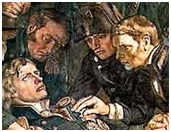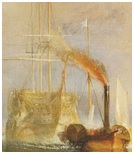|
 |
|
 |
|
|
||
The Battle of Trafalgar - Nelson, Leadership and Strategy
The Battle of Trafalgar (1805)
Famous for...
1. British success A crushing defeat of the French and Spanish fleets on 21st October 1805 by the British navy led by Horatio Nelson (pictured right) His battleship, Victory, is now in Portsmouth harbour in southern England.
2.“England expects that every man will do his duty” This was Nelson’s message (signalled by flags) to his fleet just before the battle:
3. Nelson’s heroic death He did say to one of his officers (Thomas Hardy):“Kiss me, Hardy”. But his actual dying words were: “Thank God I have done my duty” and finally... “God and my country”
Where did it happen? Near Cadiz and Cape Trafalgar off the coast of south-western Spain.
Nelson’s other victories
1797 Battle of Cape St. Vincent (defeating the Spanish fleet).
1798 Battle of the Nile (defeating the French).
1801 Battle of Copenhagen Where Nelson:
Key people at Trafalgar
Leader of the British fleet. Cuthbert Collingwood (pictured right) Nelson’s deputy.
Pierre Villeneuve Leader of the French and Spanish fleets in the flagship, Bucentaure.
Thomas Hardy (pictured right) Captain of Nelson’s flagship, Victory.
Ships in battle Nelson had 12 ships (against 16 of the enemy). Collingwood had 15 (against 17) .
The battle plan Two simultaneous attacks:
Key events
11.30 am (approx.) Nelson sends the signal: “England expects that every man will do his duty”.
11.50 am Villeneuve (pictured right) shows his flag and Nelson immediately heads for his ship, Bucentaure.
12.10 pm Collingwood in the Royal Sovereign attacks the Spanish ship, Santa Ana.
12.35 pm After being under heavy fire for half an hour, Victory (pictured right) fires its first shots. Victory's route is blocked and is forced to crash into the French ship, Redoutable.
1.15 pm Nelson shot and carried below deck. He covers his face and medals to conceal his fate from the enemy.
1.30 pm The Redoutable surrenders.
2.15 pm Villeneuve surrenders after the Bucentaure is destroyed. The Santa Ana surrenders to Collingwood. Collingwood's ship, the Royal Sovereign, is badly damaged after two hours fighting.
3.30 pm Hardy (captain of the Victory) tells Nelson about the British victory. Nelson reminds him to anchor the fleet.
4.30 pm (approx) Nelson dies with Hardy and asks “Kiss me, Hardy” as a sign of affection (pictured right in Daniel Maclise's painting).
What was the battle like? Extremely dangerous and bloody with killed or wounded:
Flying everywhere, killing and maiming people, were:
Sailors lost their guts, legs, or arms. Nelson was splattered with the blood of his decapitated secretary, John Scott.
Why Nelson won – the 6 C’s (see also Horatio Nelson).
1. Charisma His men loved him because of his:
a) courage Nelson led from the front and lost in battle his
b) energy and positive thinking Nelson
c) charm He made everyone he met feel important.
d) enormous confidence and self-belief Nelson was driven to be a hero by the insecurity caused by his:
e) brilliant leadership See point 2.
2. Competence He was a brilliant and revolutionary strategist who:
a) always attacked Nelson attacked the enemy with daring and speed (to maximize confusion) At Traflagar, this was very risky because the wind wasn't strong.
b) tried new tactics He rejected the old idea of attacking in a single line parallel with the enemy. At Traflagar, he attacked the enemy's centre and rear.
c) delegated He effectively delegated authority to people he knew the best and trusted like:
d) listened to and involved his men in decision making Collingwood said that Nelson “did nothing without my counsel”.
3. Communication He was a great speaker with a talent for inspirational phrases like: “England expects that every man will do his duty”. Nelson clearly informed all his commanders (see point 4) what he intended to do and what he wanted them to do.
4. Comradeship He created effective teams and surrounded himself with brilliant officers like:
The Temeraire was the subject of a famous painting, pictured right, by the English artist, J.M.W. Turner.
5. Commitment Many men were involuntarily press ganged into the navy But Nelson still inspired super-human effort from them – how?
a) character This won his men's trust and respect.
b) fair treatment (with strict discipline).
c) good pay and food Nelson never neglected people's physical needs.
d) excellent training and gunnery The British guns and gunpowder were better than the enemy's The British gunners were also trained to be much quicker (firing three broadsides in at least five minutes).
e) recognition He gratefully rewarded and recognized other people’s achievements (never taking credit for them).
f) accepting full responsibility (for what he did without blaming others).
g) effective communication Nelson clearly communicated everyone’s aims in battle
h) empowerment He gave his officers and men the responsibility to carry out his battle objectives, because he had total confidence in them (unlike the French commander, Villeneuve).
6. Conscience Nelson was a moral paradox, deeply vane and ambitious but a selfless servant of God, his country and his men. He was never hypocritical and stayed true to his values.
Results of Trafalgar 1. Hero worship Nelson became a national hero, leading to the construction of Nelson’s Column, pictured right, in Trafalgar Square, London (named after the battle).
2. Empire Trafalgar gave Britain:
Best book Tim Clayton and Phil Craig, Trafalgar (2004)
Key quotes (by Nelson)
England expects that every man will do his duty (pre-battle message).
May humanity after victory be the predominant feature of the British fleet (pre-battle diary entry).
Thank God I have done my duty (last words).
Life with disgrace is dreadful. A glorious death is to be envied.
Other key quotes
Britannia’s god of war. (description of Nelson) - Lord Byron, pictured right, the English poet.
He valued life only as it enabled him to do good and would not preserve it by any act he thought unworthy, - Admiral Collingwood (describing Nelson). |
|
|
||
|
|
||
| Copyright © wisdomtowin.com 2025 All Rights Reserved | ||
|













